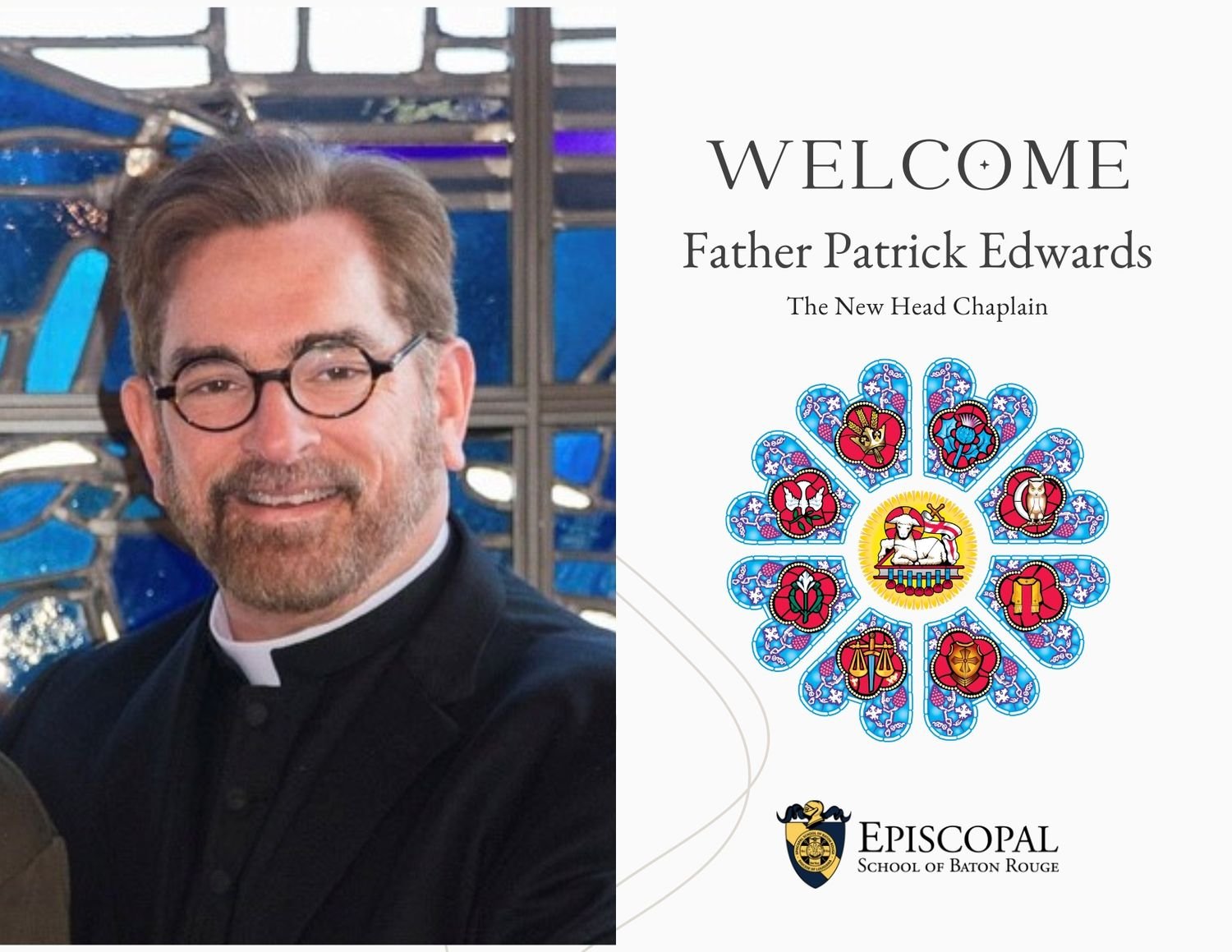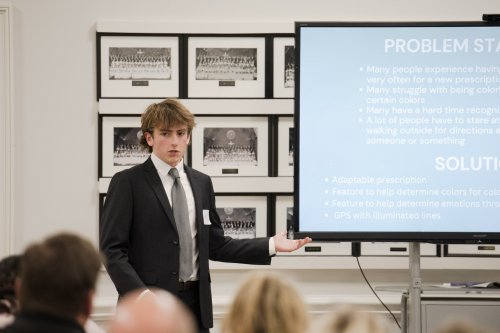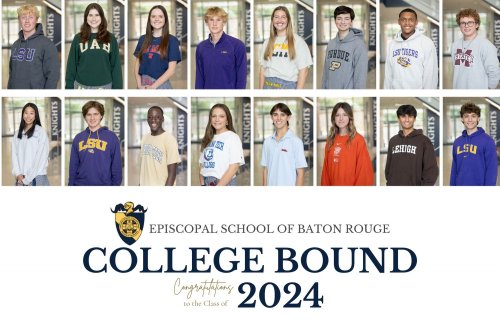- Discover Episcopal
- Admission
- Our Program
- Athletics
- Arts
- Spirituality
- Student Life
- Support Episcopal
- Alumni
- Parent Support
- Knightly News
- Contact Us
- Calendar
- School Store
- Lunch Menu
- Summer Camps
« Back
CSI: Episcopal?
September 18th, 2019

In a corner classroom of the Academic Commons, students are learning lessons taken straight from the headlines. Recently, a group of juniors and seniors analyzed fabric fibers found at a makeshift crime scene to determine who committed the crime. Students entered a hall roped off by crime scene tape and collected fibers from within a “chalk” outline. They were then tasked with looking at the fibers with a dissecting microscope or a digital camera to identify the type of fiber present. Prior to studying fibers, students spent several class periods learning the details of fingerprinting. They used inks and brushes that you might expect to find in a crime lab. There were balloons taped up in the lab areas with dusty print marks appearing faintly on them. Both lessons were engaging and hands-on.
This is Upper School Forensic Science
In speaking with Upper School science department chair Sarah Pulliam, it’s easy to feel her enthusiasm for the class. “Episcopal is a school that is open to letting people teach their expertise and provide students with a variety of exciting learning opportunities,” she says. Forensic science is back by popular demand this year because students expressed interest in additional science electives. Pulliam says with many students using eighth grade physical science for Upper School credit, a large number of students are not required to take additional science courses once they reach their senior year. This opens up the possibility for students to take science courses simply because they are curious. With popular television shows depicting forensic science, Pulliam says this new course definitely has a “cool factor” and attracted more students than expected to enroll.
 “It’s one of those sciences that brings it all together,” says Pulliam. “This is the quintessential exercise in deductive reasoning.” Forensic science provides a tremendous opportunity to go more in depth in chemistry, biology and physics. While the new focus on forensics may be a hook in getting students to enroll in the course, Pulliam takes every opportunity to point out the science involved in each discussion. For example, there are biology and anatomy components of fingerprint analysis and there are psychological elements involved in analyzing the personality traits reflected in handwriting.
“It’s one of those sciences that brings it all together,” says Pulliam. “This is the quintessential exercise in deductive reasoning.” Forensic science provides a tremendous opportunity to go more in depth in chemistry, biology and physics. While the new focus on forensics may be a hook in getting students to enroll in the course, Pulliam takes every opportunity to point out the science involved in each discussion. For example, there are biology and anatomy components of fingerprint analysis and there are psychological elements involved in analyzing the personality traits reflected in handwriting.
Pen and Paper Provide Insights into Personality
“Look at how you cross your t’s and dot your i’s,” said Pulliam in a recent class discussion. Students were learning the intricacies of handwriting analysis and how handwriting can be used in a criminal case. Pulliam showed students a news story regarding the ransom note in the Jon Benet Ramsey case. The students’ interest was sparked with one student even asking if the class could solve the case. After a discussion on what to look for when analyzing writing, students practiced analyzing their own handwriting as well as their classmates’ handwriting. To add excitement to the exercise, Pulliam had one student write a fake ransom note in which he tried to mask his writing traits. Students later had to try and guess who wrote it.
Senior Alexander Harlan says he enrolled in the course because criminal justice has always been a field of interest for him and he hopes the course will shed light on whether it’s an appropriate career choice. Already, he says he’s learned a lot. “There’s a lot more to investigating than I knew of,” he says.



Over the course of the semester, students will put their investigation skills to the test. They will study decomposition, bullet signatures, blood splatter and DNA analysis. The group will also take a trip to the state police crime lab where they will have the opportunity to see the science in action. For students who are particularly passionate about the field or who need additional science credits, the spring semester should prove to be equally as engaging. Beginning next semester, Upper School teacher Jennifer Purnell will teach a biotechnology course. With an increased interest among students in this topic, it should be a popular second act to forensics.
One of the strengths of the Episcopal experience is the opportunity for students to experience personalized learning. Students learn at their own pace and based on their own interests, while parents remain confident in the academic rigor of the course content. Teachers enjoy the opportunity to provide engaging lessons based on student feedback and requests. Forensic science in Upper School provides more evidence of what makes the Episcopal experience so special.
The Episcopal School of Baton Rouge 2024-2025 application is now available! For more information on the application process, to schedule a tour, or learn more about the private school, contact us at [email protected] or 225-755-2685.
Posted in the categories All, Upper School.
Other articles to consider
 May16Episcopal Welcomes Father Patrick Edwards as New Head Chaplain
May16Episcopal Welcomes Father Patrick Edwards as New Head ChaplainLearn more about new Episcopal Head Chaplain Father Patrick Edwards.
See Details May16Lower School Happenings - May 2024
May16Lower School Happenings - May 2024There's excitement and joy in Lower School as students wrap up the school year. Check out the latest projects.
See Details May16Future Business Leaders Benefit from Spring Lessons/Community Support
May16Future Business Leaders Benefit from Spring Lessons/Community SupportEpiscopal students participated in two real-world learning experiences – the What’s Your Bright Idea? Episcopal Pitch Contest and the annual Burkenroad Reports Investment Conference.
See Details May8College Announcements 5.10.24
May8College Announcements 5.10.24Please join us in congratulating members of the Class of 2024 as they announce their college enrollment decisions.
See Details
Categories
- All
- Admission
- Athletics
- College Bound 2019
- College Bound 2020
- College Bound 2021
- College Bound 2022
- College Bound 2023
- College Bound 2024
- Counselors Corner
- Episcopal Alumni
- Giving
- Head Of School
- Lower School
- Middle School
- Spirituality And Service
- Student Work
- The Teachers' Lounge
- Upper School
- Visual And Performing Arts
Recent Articles
- 05/16/24Episcopal Welcomes Father Patrick Edwards as New Head Chaplain
- 05/16/24Lower School Happenings - May 2024
- 05/16/24Future Business Leaders Benefit from Spring Lessons/Community Support
- 05/8/24College Announcements 5.10.24
- 05/7/24Episcopal's Addisyn Botos Will Continue Track & Field at Southern Miss
- 05/7/24Spring Sports Success!
- 05/3/24Episcopal Audiences Wowed by "The Children of Willesden Lane"
- 05/3/24Service Learning & Community Impact Students Share Thoughts on Earth Day
- 05/2/242024 Mums of Alums Luncheon Draws Large Crowd of Supportive Mums
- 05/2/24College Announcements 5.3.24











